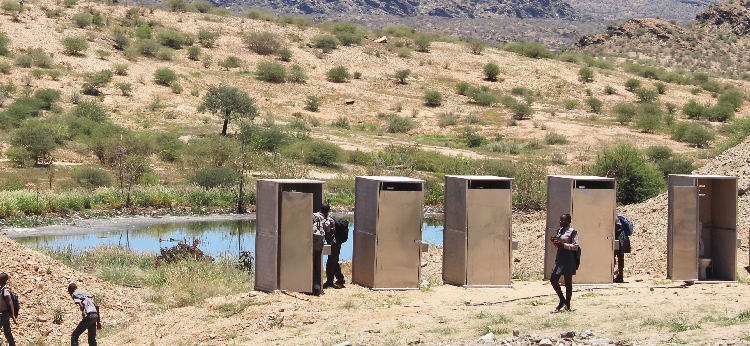THE lack of basic amenities at the Havana Project Secondary School, where more than 500 pupils are taught in military tent classrooms, is threatening teaching and learning at the institution.
The school has no chalkboards and is struggling with a shortage of textbooks, while sanitation continues to pose serious health risks to pupils as well as teachers.
Teachers are forced to use large sheets of paper to write on in the absence of chalkboards. The Havana Project Secondary School was started this year in response to a huge demand for school space at CJ Brandt High School, which is situated nearby.
The latter had a platoon system where it hosted classes in the mornings and in the afternoons. The project school was, therefore, initiated to eliminate this system and have all pupils attend school in the morning. At the new school, there are 18 tents catering for 522 pupils – 271girls and 251 boys. It has a staff of 19 teachers, who teach Grade 8 to 11.
Perched on the top of a hill on the outskirts of Havana informal settlement, the school could easily be mistaken for a military camp, owing to the rows of tents. The tents, teachers said, either become too hot during the day or the dust from the informal settlement’s gravel roads keeps disturbing classes.
At times, pupils spend the entire first period putting up tents knocked down by the gusty winds synonymous with Havana.
The school principal, Simasiku Mweti, confirming the state of affairs, said bad weather often puts classes on hold.
“There is not much good we can say about the tents. Strong winds and rain cause the tents to collapse. Every day before classes start you find one or two tents down. So, your first period will be wasted every day.”
“You will be lucky to have all the periods for the week. Consequently, pupils often have to sacrifice the first period putting up the tents, especially on Mondays,” he added. The teachers and pupils at the school are forced to share six temporary toilets.
The toilets are right next to an open sewer, which holds sewage from the nearby informal settlement.
Mweti said they are still waiting for the regional office to tell them whether they will be receiving chalkboards.
“There has been no precise indication of when, but as long as the teachers are there and the textbooks are there, teaching has to commence,” he said.
“We need containers where we can put our machines and computers,” he continued.
During a visit to the premises, The Namibian met the Grade 10 and 12 geography and development studies teacher,
Trifosa Hilulwa, who said they are slowly adjusting to the new teaching environment.
“It is not something we are happy with. We are struggling. We see that there is progress but it is not enough,” she said.
Hilulwa said although the circumstances are not favourable, she does her best to carry out her duties. “Our pupils last year used to come in the afternoon. It gets very hot in the afternoon and the sun sets early [in winter]. Therefore, pupils were behind [with the syllabus] because there was no time for extra classes or afternoon studies. Time was not on or side,” she said.
Hilulwa sympathised with pupils who have to walk long distances to and from school.
“Right now our pupils stay very far. We are at the end of Havana and these pupils walk from as far as Hakahana, Ombili and Greenwell Matongo. More than 90% of them are not brought by car,” she said.
“We have mostly poor kids, who come from disadvantaged families that struggle to even get the uniforms or books. So, they are at a disadvantage, which might at some point affect their performance,” she continued.
Several attempts to get comment from the Khomas directorate of education proved futile
Stay informed with The Namibian – your source for credible journalism. Get in-depth reporting and opinions for
only N$85 a month. Invest in journalism, invest in democracy –
Subscribe Now!










